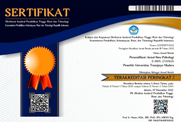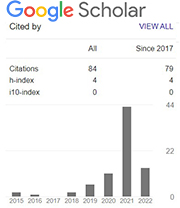Efektivitas Exercise-Based Intervention dalam Mengurangi Gejala Gaming Disorder pada Remaja: Studi Kuasi Eksperimental
Abstract
Keywords
Full Text:
PDF (Bahasa Indonesia)References
American Psychiatric Association. (2022). Diagnostic and statistical manual of mental disorders (5th-TR ed.). American Psychiatric Association. https://doi.org/10.1176/appi.books.9780890425787
Asosiasi Penyelenggara Jasa Internet Indonesia. (2023, May 15). Survei penetrasi & perilaku internet 2023. https://survei.apjii.or.id
Balhara, Y. P. S., Sarkar, S., Laspal, N., Bhargava, R., & Yadav, Z. (2023). A randomized controlled trial to assess effectiveness of GamE- an e-Health intervention to self-manage gaming with an aim to prevent gaming disorder. Asian Journal of Psychiatry, 80. https://doi.org/10.1016/j.ajp.2022.103389
Chambers, R. A., Taylor, J. R., & Potenza, M. N. (2003). Developmental neurocircuitry of motivation in adolescence: A critical period of addiction vulnerability. Am J Psychiatry, 160(6). https://doi.org/10.1176/appi.ajp.160.6.1041
Chen, Y., Lu, J., Wang, L., & Gao, X. (2023). Effective interventions for gaming disorder: A systematic review of randomized control trials. Frontiers in Psychiatry, 14. https://doi.org/10.3389/fpsyt.2023.1098922
Corder, G. W., & Foreman, D. I. (2011). Nonparametric statistics for non-statisticians (1st ed.). John Wiley & Sons.
Creswell, J. W., & Creswell, J. D. (2018). Research design: Qualitative, quantitative, and mixed methods approaches (5th ed.). Sage Publications.
Kaya, A., Türk, N., Batmaz, H., & Griffiths, M. D. (2023). Online gaming addiction and basic psychological needs among adolescents: The mediating roles of meaning in life and responsibility. International Journal of Mental Health and Addiction. https://doi.org/10.1007/s11469-022-00994-9
King, D. L., & Delfabbro, P. H. (2018). Internet gaming disorder (1st ed.). Academic Press. https://doi.org/10.1016/B978-0-12-812924-1.00001-0
Király, O., Koncz, P., Griffiths, M. D., & Demetrovics, Z. (2023). Gaming disorder: A summary of its characteristics and aetiology. Comprehensive Psychiatry, 122. https://doi.org/10.1016/j.comppsych.2023.152376
Király, O., Sleczka, P., Pontes, H. M., Urbán, R., Griffiths, M. D., & Demetrovics, Z. (2017). Validation of the Ten-Item Internet Gaming Disorder Test (IGDT-10) and evaluation of the nine DSM-5 Internet Gaming Disorder criteria. Addictive Behaviors, 64, 253–260. https://doi.org/10.1016/j.addbeh.2015.11.005
Li, A. Y.-L., Chau, C. L., & Cheng, C. (2019). Development and validation of a parent-based program for preventing gaming disorder: The game over intervention. International Journal of Environmental Research and Public Health, 16(11). https://doi.org/10.3390/ijerph16111984
Li, S., Wu, Q., Tang, C., Chen, Z., & Liu, L. (2020). Exercise-based interventions for internet addiction: Neurobiological and neuropsychological evidence. Frontiers in Psychology, 11. https://doi.org/10.3389/fpsyg.2020.01296
Li, Z., Xia, X., Sun, Q., & Li, Y. (2023). Exercise intervention to reduce mobile phone addiction in adolescents: A systematic review and meta-analysis of randomized controlled trials. Frontiers in Psychology, 14. https://doi.org/10.3389/fpsyg.2023.1294116
Lin, S., Tan, L., Chen, X., Liao, Z., Li, Y., Tang, Y., Shi, Y., Hao, J., Wang, X., Huang, Q., & Shen, H. (2023). Emotion dysregulation and internet gaming disorder in young people: Mediating effects of negative affect and metacognitions. Journal of Affective Disorders, 341, 104–111. https://doi.org/10.1016/j.jad.2023.08.077
Liu, S., Xiao, T., Yang, L., & Loprinzi, P. D. (2019). Exercise as an alternative approach for treating smartphone addiction: A systematic review and meta-analysis of random controlled trials. International Journal of Environmental Research and Public Health, 16(20). https://doi.org/10.3390/ijerph16203912
Park, J. J., Booth, N., Bagot, K. L., & Rodda, S. N. (2020). A brief internet-delivered intervention for the reduction of gaming-related harm: A feasibility study. Computers in Human Behavior Reports, 2. https://doi.org/10.1016/j.chbr.2020.100027
Patterson, M. S., Spadine, M. N., Graves Boswell, T., Prochnow, T., Amo, C., Francis, A. N., Russell, A. M., & Heinrich, K. M. (2022). Exercise in the treatment of addiction: A systematic literature review. Health Education and Behavior, 49(5), 801–819. https://doi.org/10.1177/10901981221090155
Siste, K., Hanafi, E., Sen, L. T., Damayanti, R., Beatrice, E., & Ismail, R. I. (2022). Psychometric properties of the Indonesian Ten-item Internet Gaming Disorder Test and a latent class analysis of gamer population among youths. PLoS ONE, 17(6 June). https://doi.org/10.1371/journal.pone.0269528
Stevens, M. W. R., Dorstyn, D., Delfabbro, P. H., & King, D. L. (2021). Global prevalence of gaming disorder: A systematic review and meta-analysis. Australian and New Zealand Journal of Psychiatry, 55(6), 553–568. https://doi.org/10.1177/0004867420962851
Stevens, M. W. R., King, D. L., Dorstyn, D., & Delfabbro, P. H. (2019). Cognitive–behavioral therapy for Internet gaming disorder: a systematic review and meta-analysis. Clinical Psychology and Psychotherapy, 26(2), 191–203. https://doi.org/10.1002/cpp.2341
Thomas, J., Gaspar, C. M., Al Beyahi, F., Al Bassam, B., & Aljedawi, Y. (2024). International comparison of gaming disorder symptomatology: Analysis of Ithra’s 30-nation digital wellbeing survey. Computers in Human Behavior, 150. https://doi.org/10.1016/j.chb.2023.107993
Williams, L. (2019). Zumba classes: dancing your way to fit. https://www.verywellfit.com/zumba-pros-cons-and-how-it-works-4688722
World Health Organization. (2019). International classification of diseases. https://icd.who.int
Wu, M. E. (2020). Sampling theory and practice (1st ed.). Springer Nature Switzerland AG.
Zhang, M. X., Yu, S. M., Demetrovics, Z., & Wu, A. M. S. (2023). Metacognitive beliefs and anxiety symptoms could serve as mediators between fear of missing out and gaming disorder in adolescents. Addictive Behaviors, 145. https://doi.org/10.1016/j.addbeh.2023.107775
DOI: https://doi.org/10.21107/personifikasi.v16i1.26741
Refbacks
- There are currently no refbacks.
Copyright (c) 2025 Rausyan Fikri Muhammad Ilham, Nada Khalisha Ikaputri, Muhammad Rafli Iltizamulloh, Salwa Naira Aluina Jasmine, Shafia Islaha

This work is licensed under a Creative Commons Attribution 4.0 International License.


Personifikasi by Universitas Trunojoyo Madura is licensed under a Creative Commons Attribution 4.0 International License.










